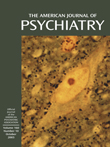Pharmacogenetics of Antidepressant Medication Intolerance
Abstract
OBJECTIVE: The authors sought to identify genetic markers for antidepressant medication intolerance. Genetic variation in drug metabolizing enzymes such as cytochrome P450 2D6 (CYP2D6) has been postulated to underlie antidepressant intolerance (pharmacokinetic effect). However, variation in genes encoding serotonin receptors could also explain antidepressant side effects (pharmacodynamic effect). METHOD: An 8-week, double-blind, randomized pharmacogenetic study compared the widely prescribed antidepressants paroxetine (a selective serotonin reuptake inhibitor [SSRI]) and mirtazapine (not an SSRI) in 246 elderly patients with major depression. Genotypes were determined for the 102 T/C single nucleotide polymorphism (SNP) in the serotonin 2A (5-HT2A) locus (HTR2A), previously associated with psychotropic medication treatment outcome. Oligonucleotide microarrays were used to extensively characterize variation in the CYP2D6 gene. Clinical outcomes included treatment discontinuations, adverse events, medication compliance, and change in mood. RESULTS: Survival analysis showed discontinuations due to paroxetine-induced side effects were strongly associated with the HTR2A C/C genotype. There was a significant linear relationship between the number of C alleles and the probability of discontinuation. Side effect severity in paroxetine-treated patients with the C/C genotype was also greater. In contrast, HTR2A 102 T/C genotype had no effect on mirtazapine side effects. CYP2D6 genotype did not predict treatment outcome for either medication. CONCLUSIONS: Pharmacodynamic differences among patients due to variant 5-HT2A receptors appear to be more important than pharmacokinetic variation in determining paroxetine intolerance. Pharmacogenetic markers may be useful in predicting antidepressant treatment outcome.



